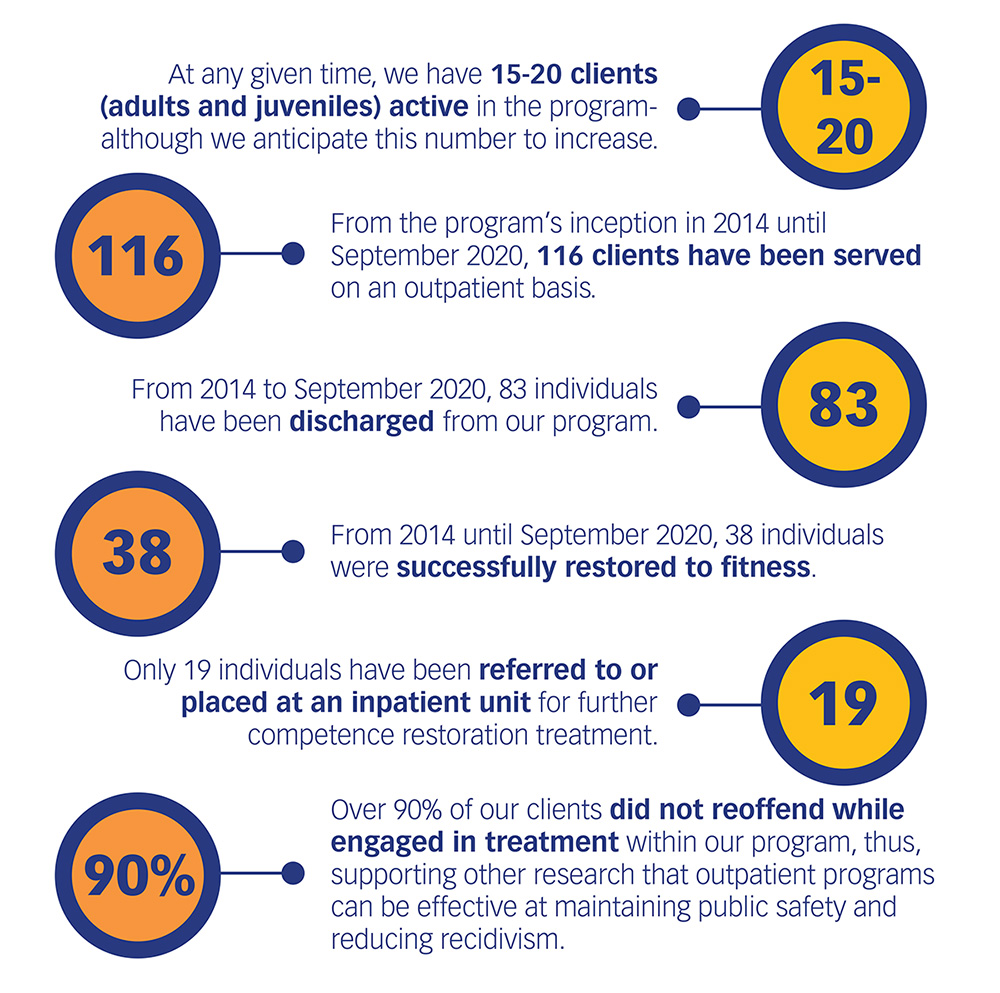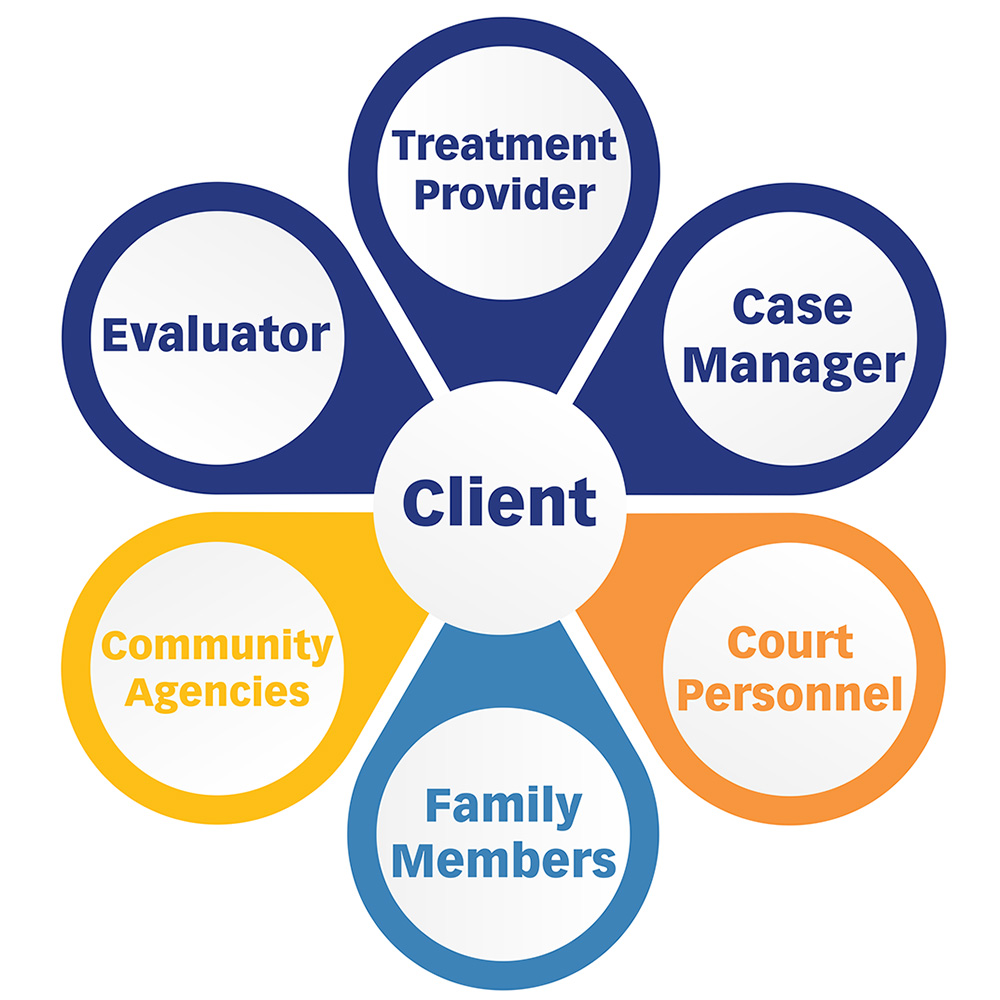Outpatient Fitness to Stand Trial Restoration Program
About Our Program
The Forensic Center’s Outpatient Fitness Restoration for persons found incompetent/unfit to strand trial is one of the first formal outpatient fitness restoration programs in Illinois. Supported by a $1.5 million grant from the Illinois Department of Human Services (IDHS), the primary treatment goal for persons enrolled in the program is restoration to competency to stand trial, so their legal charges may be fairly adjudicated. Other goals of the program include improvement in mental health outcomes, as well as reduction of recidivism and public safety.
Utilizing instruction materials about how the court works combined with counseling and ongoing assessment, clients gain sufficient skills in order to be able to understand the nature and purpose of the legal charges against them, as well as participate in their own defense. Historically in Illinois, individuals found unfit to stand trial were primarily placed for inpatient psychiatric care. Our outpatient program allows for individuals to remain in the community with their families or other support systems, while engaging in mental health and fitness restoration treatment.
Statistical Overview

- At any given time, we have 15-20 clients (adults and juveniles) active in the program – although we anticipate this number to increase.
- From the program’s inception in 2014 until September 2020, 116 clients have been served on an outpatient basis.
- From 2014 to September 2020, 83 individuals have been discharged from our program.
- From 2014 until September 2020, 38 individuals were successfully restored to fitness.
- Only 19 individuals have been referred to or placed at an impatient unit for further competence restoration treatment.
- Over 90% of our clients did not reoffend while engaged in treatment within our program, thus, supporting other research that outpatient programs can be effective at maintaining public safety and reducing recidivism.
Holistic Approach to Integrated Care

The word “client” is located in a circle surrounded by six other circles with the following text in flower petal formation:
- Top Left: Evaluator
- Top: Treatment Provider
- Top Right: Case Manager
- Bottom Right: Court Personnel
- Bottom: Family Members
- Bottom Left: Community Agencies
Evaluation, Treatment and Case Management
An evaluator assesses client’s fitness abilities at intake (30-Day Evaluation) and every 90 days thereafter (90-Day Evaluations). These evaluations are submitted directly to court personnel (judge, defense attorney, prosecuting attorney) upon completion.
A treatment provider meets with the client weekly or bi-weekly to provide fitness restoration treatment. Student trainees are key members of the fitness restoration team. The training group usually consists of six to seven students enrolled in masters or doctoral programs at The Chicago School. All services are supervised by licensed clinical psychologists.
A case manager works with clients and their families to provide psycho-education regarding diagnosis, resources and support around medication compliance, and general support to families as they navigate the legal system. Each client and relevant family member meets with our case manager to review and identify additional areas of support that may benefit the family, and provides linkage to and follow-up support to critical resources (e.g., TANF, Medicaid).
The Forensic Center can also provide adjunctive therapy services for clients who may benefit. However, The Forensic Center does not currently provide psychiatric (medication) services. The case manager can refer to community agencies or work with community agencies with whom clients are already connected.
Referral Process
The Forensic Center is pleased to offer fitness restoration services on an outpatient basis, as such an approach is embedded in least restrictive principles and other social justice values. Referrals to the program require a judge’s court order, and are coordinated by IDHS; however, attorneys can play an important role by encouraging the court to order outpatient treatment when appropriate.
All referrals MUST first go through the Illinois Department of Human Services (IDHS) before being assigned to our program. Please send referral information to Dr. Agorista Barczak at [email protected]. Please note: We cannot begin services until the case has been formally assigned to our program through IDHS.
All referrals should include the following information:
A certified copy of the order to undergo outpatient treatment
• Complete copy of the report prepared under Section 104-15 (original fitness to stand trial evaluation)
• Copy of the arrest report and criminal charges
• Arrest record
• All additional matters which the Court directs the clerk to transmit (in this case, any prior mental health records or prior fitness evaluations are helpful)
*Contact number and/or address for the client
For more information about the program and the referral process, please contact:
Dr. Casey Sharpe
Clinical Director
[email protected]
312-329-6609.
How does therapy help?
Psychotherapy helps people understand that they can do something to improve their situation. That leads to changes that enhance healthy behavior, whether it’s improving relationships, expressing emotions better, doing better at work or school, or thinking more positively. – The American Psychology Association
